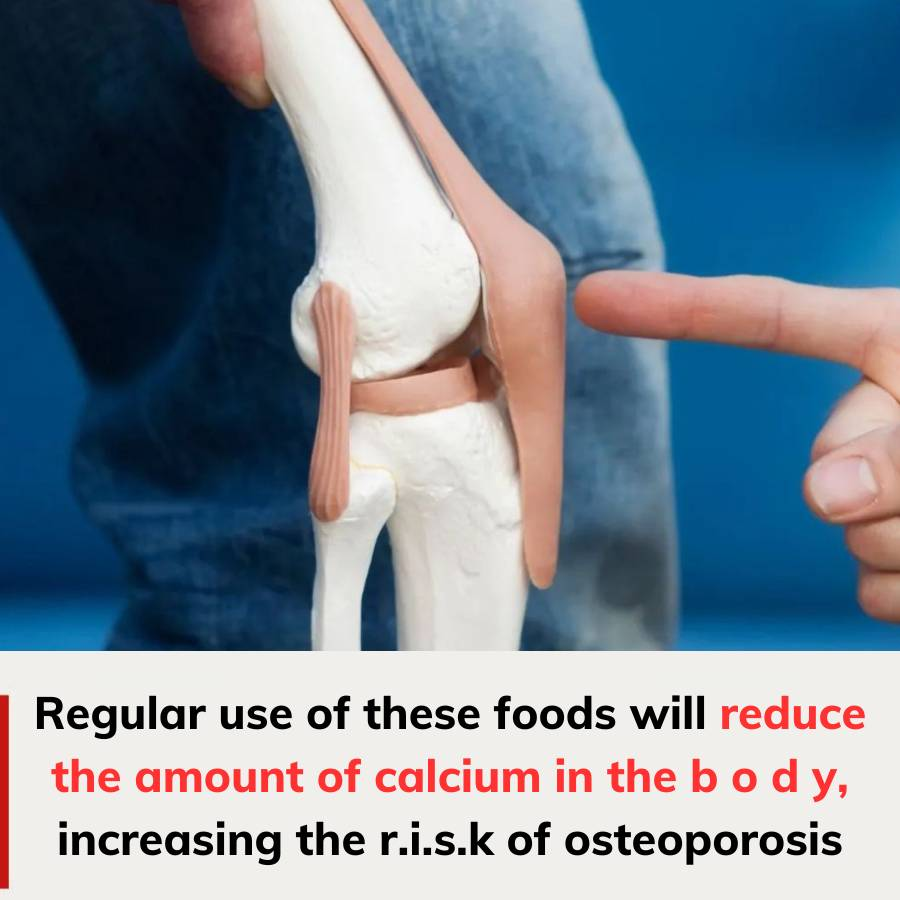Calcium is essential for strong bones and healthy joints, but some common foods can drain this vital nutrient from your body. Regularly consuming certain foods can lead to calcium deficiency, increasing your risk of osteoporosis, fractures, and other bone-related issues. Let’s dive into the key foods that deplete calcium and how to protect your bones with smarter dietary choices.
Salty Foods: A Hidden Threat to Bone Health

We all love the taste of salty snacks, but high-sodium foods can silently damage your calcium reserves. Processed snacks like chips, canned soups, pickles, and instant noodles often contain excessive levels of sodium, which negatively impact bone health.
Sodium causes the body to excrete calcium through urine. Research shows that for every 1,000 milligrams of sodium consumed, approximately 26 milligrams of calcium are lost. Over time, this loss can weaken bones and increase the risk of fractures.
To protect your bones, opt for fresh, whole foods instead of processed items. Replace salt with natural herbs and spices when cooking, and limit your daily salt intake to about one teaspoon, as recommended by health experts.
Fatty Foods: Blocking Calcium Absorption
Fat is an important part of a balanced diet, but consuming excessive amounts of unhealthy fats can hinder your body’s ability to absorb calcium. Foods like fried items, fatty cuts of meat, and rich desserts interfere with calcium absorption in your digestive tract.
Fat binds with calcium during digestion, forming compounds that the body cannot absorb. Even if your diet is rich in calcium, too much fat can prevent your bones from benefiting from this essential nutrient.
Switch to healthier fats like those found in avocados, olive oil, and nuts. Avoid deep-fried and greasy foods, and pair calcium-rich foods with low-fat options to maximize nutrient absorption.
Soft Drinks: A Risky Beverage Habit
Sodas and other carbonated drinks are a popular choice, but they come with a significant downside for your bones. Regular consumption of soft drinks is linked to reduced bone density and a higher risk of fractures.
Soft drinks often contain phosphoric acid, which interferes with calcium absorption. Additionally, replacing calcium-rich beverages like milk with soda reduces overall calcium intake, leading to weaker bones over time.
Instead of soft drinks, choose water, herbal teas, or smoothies made with calcium-rich ingredients. If you enjoy carbonation, sparkling water without added sugars or artificial flavors is a better alternative.
Caffeine: A Double-Edged Sword
Coffee is a daily ritual for many, but excessive caffeine intake can harm your calcium levels. Coffee, tea, and energy drinks can increase the amount of calcium excreted through urine.
Caffeine prevents your body from absorbing calcium effectively. Drinking several cups of coffee a day can gradually deplete your calcium reserves, leaving your bones more vulnerable to weakness.
To enjoy coffee without compromising your bones, limit your intake to one or two cups a day. Pair your coffee with calcium-rich snacks like yogurt or cheese, or consider switching to decaffeinated options.
Alcohol: Weakening Your Bones Over Time
While an occasional drink might not seem harmful, excessive alcohol consumption can significantly impact your bone health. Alcohol slows down bone regeneration, reduces bone density, and increases the likelihood of fractures.
Alcohol disrupts calcium absorption and lowers hormone levels essential for bone formation. It also depletes magnesium, a crucial nutrient that works alongside calcium to maintain strong bones.
Limit alcohol consumption to one drink per day for women and two drinks per day for men. To further protect your bones, choose beverages fortified with calcium or vitamin D.
High-Sodium Processed Foods: A Calcium Drain
Processed foods like frozen pizzas, deli meats, and instant ramen noodles are not only convenient but also loaded with sodium. These high-sodium options can lead to increased calcium excretion and weaken your bones over time.
Prepare home-cooked meals using fresh ingredients to control sodium levels. Read nutrition labels carefully, and opt for low-sodium alternatives whenever possible.
Foods High in Oxalates: A Double-Edged Sword
Certain healthy foods, such as spinach, rhubarb, and beets, contain oxalates—compounds that bind with calcium and reduce its absorption. While these foods are nutritious, they can limit the availability of calcium in your body.
Pair high-oxalate foods with calcium-rich items to offset the effect. For example, eat spinach with a serving of cheese or yogurt. You can also include low-oxalate greens like kale and broccoli in your diet to support bone health.
Beef: The Nutritional Trade-Off
Beef is a protein-rich food that provides important nutrients like iron, but excessive consumption can lead to calcium loss. Digesting beef requires calcium, which is then excreted through urine, leaving your bones at risk of depletion.
To balance your diet, limit beef consumption to a few times a week. Incorporate plant-based protein sources like lentils and beans to reduce dependency on meat. Pair beef dishes with calcium-rich sides like steamed broccoli or spinach to support your bones.
How to Safeguard Your Calcium Levels
Maintaining strong bones and joints requires a balanced diet and mindful choices. Incorporate these strategies to protect your calcium levels and overall bone health:
- Add calcium-rich foods like dairy products, fortified plant-based milks, almonds, and leafy greens to your meals.
- Boost your vitamin D intake by spending time in the sun or eating foods like fatty fish, egg yolks, and fortified cereals.
- Stay hydrated with water and avoid sugary or caffeinated beverages that deplete calcium.
- Treat salty, fatty, or sugary foods as occasional indulgences rather than dietary staples.
Conclusion: Protecting Your Bones With Smarter Choices
Your diet plays a vital role in your bone health. Foods like salty snacks, sodas, and alcohol may seem harmless in moderation, but consuming them regularly can deplete calcium levels and weaken your bones. By making informed decisions about what you eat and drink, you can take proactive steps to maintain strong, healthy bones.
Small adjustments—such as reducing sodium, limiting caffeine, and prioritizing calcium-rich foods—can make a significant difference. Strong bones are built on smart choices, and it’s never too late to start protecting your skeletal health for a stronger, healthier future.


